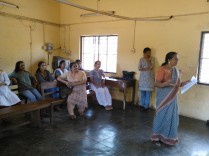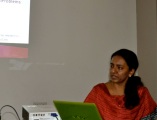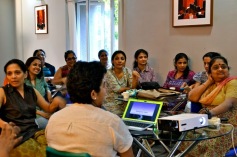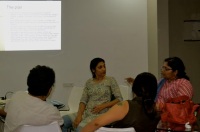Nandini Valsan (@nvalsan) has shared a Tweet with you:
“FarOutAkhtar: MARD is an initiative asking men to rethink their own value system. To think (cont) http://t.co/lMYJZsYjuF”
—http://twitter.com/FarOutAkhtar/status/313220279813947392
Nandini Valsan (@nvalsan) has shared a Tweet with you:
“FarOutAkhtar: MARD is an initiative asking men to rethink their own value system. To think (cont) http://t.co/lMYJZsYjuF”
—http://twitter.com/FarOutAkhtar/status/313220279813947392
Nandini Valsan
Is there a point to everything that we strive to do through noble endeavours like Raising Our Voices? What are we achieving? Can we ever really make a difference by creating a gender balanced society? Such questions flood my mind as I listen to instances happening all over the place. Sometimes I feel, at least we can do something. We can educate a certain section of the vast population that is in our midst. But how far reaching can we ever get?
And you know what is at the root of most problems that impede this? The one and only evil. The Darth Vader of our existence. DOWRY.
As long as there is a thriving dowry system in this country and women are exchanged as commodities amongst men, there can never be an inkling of gender equality. Having a daughter at home in this country, means that she has to be married off. To marry her off, one needs much money, in addition to all kinds of paraphernalia to give to the groom who is happily being bought for his supposed shelter. What kind of world are we living in? Why are men so happy to be treated as commodities themselves, commanding high “demands” for their worth from their in laws? Do THEY have no self pride to just put themselves out on a market as if they were cattle?
The reason for this present rampage of mine is a result of a long discussion with my household help, Mamuni, on the pending marriage of one of her sisters. She is from Kharasahapur, Orissa and the third child in a family of six children. In the quest for a boy, Mamuni’s parents first had to settle for four girls before the much coveted male child made his appearance. And then, a few years later, an accidental bonus resulted in the sixth child, yet another girl! Although from otherwise a reasonably well off family, the burden of a large family was huge for Mamuni’s father. But he loved all his children and educated his girls as much as he could. Mamuni’s second sister even did a year in college and Mamuni herself completed her ninth standard. Mamuni’s younger sisters are also still in school, while her brother just completed a year in a vocational college. When Mamuni came to Kerala to work, it was her decision to leave her family to help her father. Her family was against it. However, she saw her father languishing with the financial burden and with a brother who was barely 10years old at the time, she decided to take her family’s fate into her own hands. A relative working as a gardener in Kerala told her that there was an old lady who needed a caretaker in Kochi and brought her along on that premise…to work as a maid with us. Later she would tell me what a surprise it was for her when she reached here and realized that her duties did not have anything to do with “plucking flowers for an old lady’s pooja” and listening to her stories…but that she had to do housework! Mamuni being the person she is with a very strong individual resolve decided to stick it out and became the main breadwinner for her family, sending back all her salary to her family. For us, it was a boon. Extremely affable and pleasant, she very soon became an integral part of our family. I like to think that she is happy with us too and that in some way we do provide a life to her that is more enriching than the life she would have led in Orissa.
So back to the present. Recently an alliance came for Mamuni’s second sister. The family had been looking out for a prospective groom for this sister for a while now, after all, it was more than five years since the elder daughter’s wedding and there were still three more girls in the family to be wedded off. The wedding had more or less been fixed, and a confirmatory engagement was expected on the 25th. Today Mamuni told me that the boy’s family was “demanding” Rs25000/- in addition to the customary gold ornaments, household goods, dresses for all the family members etc. She said that they had actually asked for Rs 40000/- but had come down to this new quote. However, this amount itself was too high for her father to think of at the moment. I was livid upon hearing this at first and told her that her father should be aware that its not just taking dowry that is illegal in this country but also giving it. But, what difference does the law actually make where it really is needed? Mamuni questioned me of the same. Ultimately the girl just won’t be married off if they try and bring the police or the law into the situation. She also said that of all the rishtas that had come, this was the more reasonable one as some fellow earlier had asked for a Hero Honda worth Rs55000 instead of money!!
While I waxed intellect and rights to her, a part of me knew that even if she got what I meant, it would hardly make a difference back home. After all the prospective bride was 23 already. She had some burn scar on the top of her head from a childhood accident, which she generally covered with her hair, but a scar is a scar after all(!). The fact that this girl was a brilliant student who went on to do a year of college before she had to drop out to help her family, made no difference. The fact that she was earning money by giving tuition classes to the village children was inconsequential. All that mattered at this point was that she was a woman who needed to be married off and to do that, one needed to shell out a whole lot of money.
I told Mamuni that her family was much better off not marrying her sister off if the boy’s family is going to be so demanding right at the beginning itself. After all, she was bringing in some income and was a help within the household. She was far from being a financial burden in the house and on the contrary, marrying her off would mean more of a financial crisis for the family as well as a depletion in their income. Plus the house she was going to was a big joint family, of which she would be the only bahu in her generation, almost certainly guaranteeing all the household work in the place coming on to her head. The groom sounded like a meek man who would not do much to speak out for her. He apparently went quietly to Mamuni’s aunt who brought the alliance to the family and told her to tell Mamuni’s family to give whatever money they had and that he would help them pay the rest of the money off with his salary over the months. The fact that he didn’t have the guts to just go to his family and express his interest in the girl and just marry her with whatever she brought was already an indication of how much say he had in matters. Plus, he works in a government office in Cuttack and had no intention of taking his bride there. Instead she would be living with the in laws back in the village. My husband and I reasoned with Mamuni that there is no point in even “negotiating” a better deal with this particular alliance, and that it made more sense for the family to have her sister in their midst, being of help to her father, than to take on financial loans to “get rid” of her.
So I gave all this advice, but a fear lurks inside. of me. It’s all very well for me to talk of high ideals like courage and self worth, but ultimately, that girl’s future in the eyes of her parents are at stake here. With three more girls to marry off over the years, can they even afford to stand up to the dowry bullies at such a time. Despite the fact that the Mohalik family is pretty much being financed by the regular funds from one of the daughters, as well as the meager but valuable contributions of the bride in question, courtesy of her tuition classes, as far as the outside society is concerned, their value is nil and it is the boy that has to be bought.
To be fair on Mamuni’s father, Ramachandra Mohalik, he is not too keen on this particular alliance, but pressure from Mamuni’s maternal uncle’s family who brought the proposal, is very strong and considering their circumstances, very easy to buckle to. After marrying off his first daughter, Ramachandra has already seen how the expenses and demands from the boy’s family never end. He knows that this Rs 25000/- is only a start to many more payments he will have to dole out over the years for medical expenses, delivery expenses, celebrations, etc. And then there are the other girls to marry off. That’s the sad part of the story. Even though he knows that things will only get worse financially, he sees marrying off his daughter off a necessary evil that must be done, for the society that he lives in. The thought that there may be some man out there who will come and ask for his daughter without any “demands” is not even a part of his mental framework. And sadly, that’s probably also because it really is something that is far out from reality. This same man, because of all this financial burden at this point, will undoubtedly make big demands for his one son at the time of his marriage, to somewhat make up for all that was lost along with his daughters.
So that comes to my main question. Is it really a wonder why then that people don’t want daughters in this country? From the time they are born, they are nothing but financial burdens. A possession of yours that you have to save up for so that someone else will take her from you later on. A family of just boys have to think of nothing but the riches that await them when it is time to marry them off. The birth of a girl child initiates a lifelong burden of saving up for her marriage. Not to mention, all the other minor expenses, like food, shelter and education, that come along with it. Before trying to abolish female foeticide and infanticide, we have to look at the reasons that people are forced into doing such heinous deeds. I commend Mamuni’s family for not eradicating any of their girl children at birth, but look at the consequence in the long run. Mamuni’s father made it a point to educate all his five girls, but to what end?
This is one of the moments when I feel so grateful and blessed for being born into a community that looks down upon dowry and those that even ask it. None of my cousins on either side of my family were married off with dowries. On the contrary, in our community, it is the duty of the boy’s family to ensure that they provide everything that the girl wears at the wedding and beyond (including regular outfits, underwear, nightwear, shoes etc), making the pre-wedding shopping days exciting events for the groom’s family. True, the burden of gold does rest on a girl’s family in Kerala, but there is an inherent feeling that the gold is a security for the daughter to turn to if required, rather than just cash doled out to the boy’s family at the wedding time.
But not all have it lucky like me. Actually most don’t. This lousy menace of dowry is not something that is restricted to the lower strata of society. It’s there everywhere. That’s why it’s so hard to eradicate. If Mamuni’s family were to complain to the police about someone demanding a dowry from them, do you think anything will happen of it? Of course not! On the contrary, her family is more likely to be laughed at and ostracized, again dwindling the chances of her sister getting married. Dowry’s illegal status is just a joke in this land. As long as the powers that be don’t take it seriously, we can take it as a mere token law, brought into force by a minority segment of the society who use it for their benefit to fleece people. In other words, the people who could really use the law, don’t get a chance to avail of it, but those who want to abuse the law and use it for their benefit, easily do so. What lovely justice we have around here.
If the Indian attitude towards girls and women have to change, this very basic part of the social existence has to be abolished. Not just in rhetoric but in practicality. And however optimistic I want to be, I know that this is one of the most difficult tasks at hand. They say a country’s development can be measured by the level of education of the women in that country. Educate the girl child and take the country forward they say. Well you know what the reality is? A poor man educates his girl child, invests in her and then he marries her off to someone who will keep her at home and exploit her services, while enjoying the easy cash that was made possible by his in laws. Where is the progress of society? It is not enough to educate the girl child. That education has to be allowed to be exercised. That education has to be allowed to emancipate her and not peg her down. That education has to be allowed to be truly free so that she can go out and seek employment without gathering the wrath of her in laws who would prefer her to stay at home to serve them. Education of the girl child can only do so much. Taking her out of the commodity market will do a lot more.
But who can do that? Where do we start?
Deciding to make International Women’s Day 2013 count in the annals of our history, Raising Our Voices hosted its first independent event on 7th March 2013, which served as an apt preview for all the work that is to come for our budding organization.
 The event’s activities started with a visit to the Children’s Home for Girls in Kakkanad. This home, which Raising Our Voices intends to adopt as a long time commitment, houses girls from the ages of 4-17, wherein many are victims of abuse and/or destitutes who have been given shelter. Raising Our Voices laid the foundation to our commitment to the cause by donating a range of items to the home and the children there. The goodies gifted ranged from basic day to day necessities like underwear, bedsheets and a gas stove; to a gamut of stationery material to promote the girls’ talents in art and craft. The donations were all made possible thanks to the contributions received through the efforts of various members and their friends.
The event’s activities started with a visit to the Children’s Home for Girls in Kakkanad. This home, which Raising Our Voices intends to adopt as a long time commitment, houses girls from the ages of 4-17, wherein many are victims of abuse and/or destitutes who have been given shelter. Raising Our Voices laid the foundation to our commitment to the cause by donating a range of items to the home and the children there. The goodies gifted ranged from basic day to day necessities like underwear, bedsheets and a gas stove; to a gamut of stationery material to promote the girls’ talents in art and craft. The donations were all made possible thanks to the contributions received through the efforts of various members and their friends.
Following the Home Visit, the ROV team proceeded to Mather Green Hills Community Hall, where ROV conducted its first workshop on Women’s Health by Dr Sanam Bashar from City Hospital, Kochi. Through an informal discussion session guided by Dr Bashar, we were able to openly and uninhibitedly navigate the mysteries of the working of our own bodies, in particular our reproductive system, and learn  how to ensure its health. With an audience comprising of ROV members, as well as our friends from our individual social networks, the discussion was invigorating and extremely productive with questions of interest being raised by all. Dr Bashar’s open demeanor and easy style of talking definitely contributed in ensuring a fruitful discussion that was not mired with any queasiness.
how to ensure its health. With an audience comprising of ROV members, as well as our friends from our individual social networks, the discussion was invigorating and extremely productive with questions of interest being raised by all. Dr Bashar’s open demeanor and easy style of talking definitely contributed in ensuring a fruitful discussion that was not mired with any queasiness.
It’s no secret. We as women, however “enlightened”, do have a tendency to give very little priority for our own health and often avoid getting regular gynecological check ups, thinking, why trouble trouble, when trouble is not troubling me. However, as an outcome, many women turn to for medical help much too late to make a difference. Many of our problems are curable, if not preventable, but as long as they are caught on time. The delay of diagnosing any anomaly can be fatal, and highly distressing when all it would have taken to prevent it was a regular check up. Even the most aware amongst us would admit that we don’t really give that basic courtesy to the part of our body that differentiates us as women. If we don’t give the very woman in us that respect, how can we expect others to? Taking care of our inherent womanhood is really in our own hands, and I believe that it is from this very practical process of looking out for our own individual bodies that we can step forward to address the bigger issues out there of establishing respect and equality for womankind.
The Women’s Health discussion actually went on for quite some time, but to ensure that all got full benefit from the information at hand, tea/coffee and snacks were distributed during the talk. This furthered the informality of the situation as we all openly discussed some of our most private parts with our fellow sisters, over sandwiches and cutlets!
Once the Women’s Health talk was over, we proceeded to the more serious business of establishing Raising Our Voices.
Over the weeks, as each one of us joined the group, we had gotten familiar with each other’s names over email and other virtual interfaces, but it was at this particular event that many of us got faces to the names that had become so much a part of our daily life! A round of introductions indicated the true diverse nature of our group. Each one of us coming from different backgrounds and professions, yet with a common aim of emerging from the shackles of gender imbalance that plague all our lives, however liberated our own homes may be.
 Getting everyone together for the event also served the very official purpose of setting up the foundation of our By Laws. Anisha, Phalguni and Monolita put together and very efficiently presented a “wholesome” layout of what ROV represents for the society, as well as what we aspire to achieve, which was discussed and added to by the members present. It was decided
Getting everyone together for the event also served the very official purpose of setting up the foundation of our By Laws. Anisha, Phalguni and Monolita put together and very efficiently presented a “wholesome” layout of what ROV represents for the society, as well as what we aspire to achieve, which was discussed and added to by the members present. It was decided  that though ROV membership is open to men and women, there would be a 20% cap to decision making capacities of men in ROV.
that though ROV membership is open to men and women, there would be a 20% cap to decision making capacities of men in ROV.
With time running short, the meeting wound up with a quick look at the two main projects that ROV intends to start off with. First, Sajida presented ROV’s proposal for the Adoption of the Children’s Home in Kakkanad, and secondly, Monolita gave a brief overview of the Adolescence Education School Outreach Program.
The former will entail ROV getting involved with the home on a day to day basis whereby ROV members would volunteer time each week at the home as “mothers” to inculcate self confidence, social skills and positivity in the children.
Through the School Outreach Program, ROV members will conduct workshops at various schools in Kochi with different age groups. It is our way of reaching out to the youngsters in our society; to teach them to take care of their bodies and their selves, to be free of exploitation of any kind and to remove gender stereotypes and discrimination in their minds; thus ensuring the society with a next generation that takes gender equality as a granted.
Needless to say, it was an eventful day! In a short span of time, we were able to address many pertinent issues that were in front of us, both as individuals and as a organization in the making. Mentally exhausting but invigorating at the same time, it felt good to have our foot on the accelerator pedal all set to zoom. The excitement we felt, despite our fatigue from the long day, called for a fun and unforgettable Girls Night Out! Without getting into the nitty-gritty of all that went on later that night, let me just say…the folks at Mainland China, Kochi, probably got the best whiff of what it means for our world to have a team like ROV out to rock the gender boat!